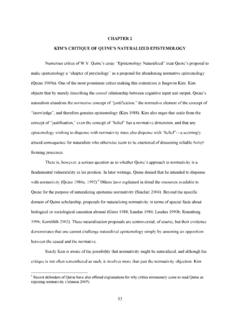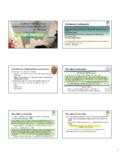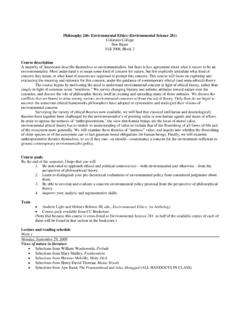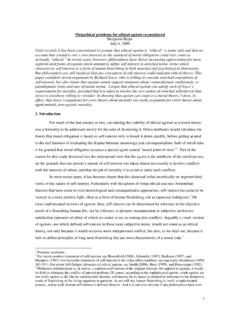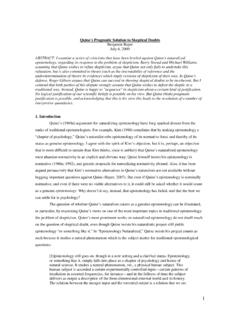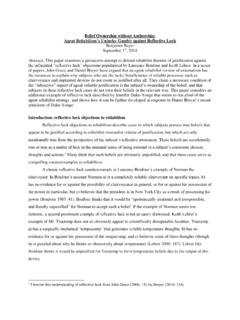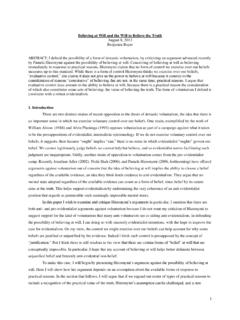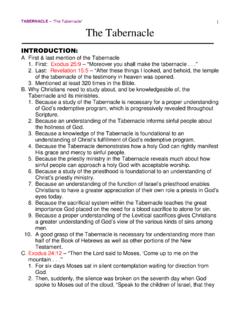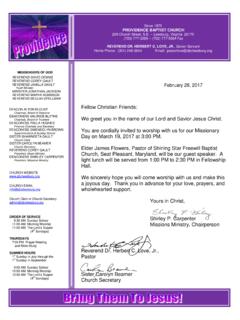Transcription of freewill--pelagius-vs-augustine - Benjamin J. Bayer ...
1 10/18/20161 Preliminary reading quiz Graded iClicker QUIZ: Select the best single answer1. augustine thinks that human beings act of their own free will when they choose to sin, even though God knows of necessity that they will sin. (A) True (B) False Lecture 5: augustine vs. pelagius on Freedom and Divine ForeknowledgeThe problem of evil Q: Why isn t God like the friend who gives the knife? God is supposed to be perfectly good so there appearsto be a conflict between these: this conflict is known as the problem of evil Q: How would you reconcile these two ideas?(1) God is perfectly good. (2) God creates beings who do evil. (1) God is perfectly good. (2) God creates beings who do evil. : If you give a knife to a man you know is dangerous, and he kills someone with it, do you deserve blame for it? (A) Yes (B) No Q: If God creates people knowing they ll commit evil acts, does he deserve blame for it?
2 (A) Yes (B) No The problem of evil St. augustine of Hippo (354 430 ) one of the most influential church fathers heavily influenced by Greek philosophy augustine s basic solution to the problem of evil: free will is good because it permits righteous action but more importantly: human beings are responsible for evil, by their free choices not God his solution to the problem of evil only sets the stage for a second, bigger problem of divine foreknowledge Q: Why think God would know the future? God is supposed to know everything (omniscient), including about the future (foreknowledge) so there appearsto be a conflict between these: this conflict is the problem of divine foreknowledge(1)God knows all things (including all future human decisions). (2)Human actions are free. (1)God knows all things (including all future human decisions). (2)Human actions are free.
3 : Does a clock created by a clockmaker who knows it will strike twelve at noon have free will? (A) Yes (B) No Q: Do human beings created by a God who knows their future have free will? (A) Yes (B) No The problem of divine foreknowledge This argument summarizes the problem: the conclusion follows are both of the premises true? augustine thinks one of them is false to see why, we need to explore his view of free will 1. If God knows what human actions will occur, then human beings have no free God is all-knowing and knows what human actions will Therefore, human beings have no free s solution augustine compares the (original) choice to sin to a fall: What causes this original choice to sin?: augustine s first answer: nothingcauses it perhaps this is to emphasize that evil is a kind of nothingness but then can blame for original sin be assigned?[W]hen the will turns away from the unchangeable and common good towards its own private good, or towards external or inferior things, it sins.
4 It turns towards its own private good when it wants to be under its own control .. In this way one becomes proud .. What is evil is the turning of the will away from the unchangeable good and toward changeable goods. And since this turning is not coerced, but voluntary, it is justly and deservedly punished with misery. -- augustine , On Free Choice of the Will augustine s solution Evodius worries: falling things are subject to natural necessity augustine reframes the question by asking: whose motionis the movement to evil? the motion by which a stone falls is the stone smotion and the movement of the soul is the soul s motion so blame the soul whose motion it is; not God Q: What s odd about comparing a blameworthy soul to a falling stone? the stone stillmoves of necessity, we don t blame it so augustine must show the difference between the natural and the voluntaryAugustine s solution The problem of divine foreknowledge: both of these don t seem like they can be true: as with all such problems, can solve by: rejecting (1) rejecting (2) or by showing that actually, both can be true (despite appearances) Q: Which strategy do you think augustine uses?
5 augustine s solution depends on his concept of free :(1) God knows all things (including all future human decisions). (2) Human actions are free. (1) God knows all things (including all future human decisions). (2) Human actions are free. 5: augustine vs. pelagius on Freedom and Divine Foreknowledge (continued) augustine s solution The problem of divine foreknowledge: both of these don t seem like they can be true: as with all such problems, can solve by: rejecting (1) rejecting (2) or by showing that actually, both can be true (despite appearances) Q: Which strategy do you think augustine uses? augustine s solution depends on his concept of free :(1) God knows all things (including all future human decisions). (2) Human actions are free. (1) God knows all things (including all future human decisions). (2) Human actions are free. s solution augustine s solution depends on his concept of free :[T]he only thing that is within our power is that which we do when we will it.
6 Therefore, nothing is so much within our power as the will itself, for it is near at hand the very moment that we will. So we can rightly say, We grow old by necessity, not by will ; or .. We die by necessity, not by will, and other such things. But who would be crazy enough to say We do not will by the will ? Therefore, although God foreknows what we are going to will in the future, it does not follow that we do not will by the you said that you cannot make yourself happy, you said it as if I had denied it. Not at all; I am merely saying that when you do become happy, it will be in accordance with your will, not against your will. Simply because God foreknows your future happiness .. it does not follow that you will be happy against your will. -- augustine , On Free Choice of the Will ( augustine ): A free act is an act that is in accord with one s will[ one s desires or wishes]( augustine ): A free act is an act that is in accord with one s will[ one s desires or wishes]def.
7 ( augustine ): A free willis a will that is in accord with itself[ one wants to want something]( augustine ): A free willis a will that is in accord with itself[ one wants to want something]def. augustine s solution augustine s solution depends on his concept of free : suppose we define freedom as follows: then the two propositions become: (1) and (2) may seem inconsistent, but (1) and (3) don t so there s nothing illogical about the idea of God s knowing we will do what we want( augustine ): A free act is an act that is in accord with one s will( one s desires or wishes)( augustine ): A free act is an act that is in accord with one s will( one s desires or wishes)def. (1) God is all knowing (including about future human actions).(2) Human actions are free. (1) God is all knowing (including about future human actions).(2) Human actions are free. ex.(1) God is all knowing (including about future human actions).
8 (2) Human actions are free.(3) Human actions are [(sometimes) in accord with human desires.](1) God is all knowing (including about future human actions).(2) Human actions are free.(3) Human actions are [(sometimes) in accord with human desires.] s solution he rejects (2): foreknowledge does not preclude free will we may will our happiness even if it is foreknown by God, and not by us1. If God knows what human actions will occur, then human beings have no free God is all-knowing and knows what human actions will Therefore, human beings have no free : Which premise of the argument does augustine reject? (A) 1 (B) 2 Pelagian free will pelagius (~354 420/440 ) British (?) monk, active Christian scholar in Rome Letter to Demetrias : advice for a young girl on maintaining her virtue Q: Why would such a letter theorize about free will? she needs to be convinced that achieving virtue is possible he presumes that with no free will, that might not be possiblePelagian free will pelagius thinks our ability to resist temptation is part of human nature: Q: How does this differ from what people sometimes mean by human nature it s often used to suggest the inevitability of corruption[God] has made all the works of and within the world good, how much more excellent do you suppose that he has made man himself, on whose account he has clearly made everything else?
9 And before actually making man, he determines to fashion him in his own image and likeness and shows what kind of creature he intends to make him.. For .. he provided him with a better armament inside, that is, with reason and wisdom.. Moreover, the Lord of Justice wished man to be free to act and not under compulsion; it was for this reason that he left him free to make his own decisions (Sirach ) .. [I]t is on this choice between two ways, on this freedom to choose either alternative, that the glory of the rational mind is based. -- pelagius , Letter to Demetrias Pelagian free will Q: What is in this passage that lets us compare pelagius to other philosophers we ve studied? a definition of free will:[God] has made all the works of and within the world good, how much more excellent do you suppose that he has made man himself, on whose account he has clearly made everything else?
10 And before actually making man, he determines to fashion him in his own image and likeness and shows what kind of creature he intends to make him.. For .. he provided him with a better armament inside, that is, with reason and wisdom.. Moreover, the Lord of Justice wished man to be free to act and not under compulsion; it was for this reason that he left him free to make his own decisions (Sirach ) .. [I]t is on this choice between two ways, on this freedom to choose either alternative, that the glory of the rational mind is based. -- pelagius , Letter to Demetrias ( pelagius ):Free will is the rational ability to choose one way or an alternate way.( pelagius ):Free will is the rational ability to choose one way or an alternate 10/18/20164 Implications of Pelagian free will pelagius thinks free willimplies the possibility of moral perfection Q: What traditional Christian doctrine does pelagius seem to be rejecting here?
